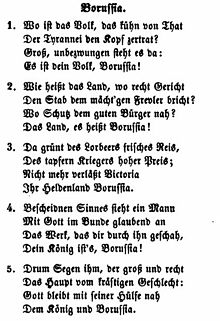Borussia (anthem)
| Borussia | |
|---|---|
| by Gaspare Luigi Pacifico Spontini | |
 Lyrics of Borussia written by Johann Friedrich Leopold Duncker |
Borussia, also known as Chant national prussien, was a patriotic Prussian song. It temporarily held the status of the national anthem. The melody is made by Gaspare Luigi Pacifico Spontini, and the text by Johann Friedrich Leopold Duncker.[1] Borussia is a neo-Latin term for Prussia and a female figure as Prussia's allegory in the song.
History
[edit]In 1814, King Friedrich Wilhelm III met the Italian composer Gasparo Luigi Pacifico Spontini in Paris, whom he brought to Berlin in 1820 as a music director. One of Spontini's first Berlin works was the composition with the title Borussia. It had already been composed by him two years ago as Chant National Prussien. He instrumented it with 100 violins, 50 trumpets, twenty other wind instruments (e.g. Bassoon, clarinet, horn) and 130 voices along with a soprano solo. It incorporated the melody of the British anthem God Save The Queen.[2][3] The text was written by Johann Friedrich Leopold Duncker the cabinet secretary of the king.[4]
On August 3, 1820, on the occasion of the birthday of King Friedrich Wilhelm III, the performance of Borussia took place in the Berlin State Opera. Within the same year, it was decreed as a Prussian national anthem and was then on sung in all schools and patriotic festivities.
The anthem was later extended by four stanzas, Karl Alexander Herklots is considered the author. However, the stanzas never became popular. They can only be found printed by August Heinrich Hoffmann von Fallersleben.[5]
While in the course of the founding of the German Empire on 18 January, 1871, in August of the same year, a performance in the Berlin State Opera, an attempt was made to revive Borussia with changed text - instead of Borussia now Germania and instead of King now Kaiser - but without success.
Text
[edit]
| German original | Literal translation |
|---|---|
1. Wo ist das Volk, das kühn von That | 1. Where is the people that bold in deeds |
Literature
[edit]- Emil Bohn: Die Nationalhymnen der europäischen Völker. In: 4. Heft der Reihe Wort und Brauch. Volkskundliche Arbeiten namens der Schlesischen Gesellschaft für Volkskunde. In zwanglosen Heften herausgegeben von Dr. Theodor Siebs, ord. Professor a. d. Universität Breslau und Dr. Max Hippe, Stadtbibliothekar in Breslau. Verlag von M. & H. Marcus, Breslau 1908.
- Franz Magnus Böhme (Hrsg.): Volksthümliche Lieder der Deutschen im 18. und 19. Jahrhundert nach Wort und Weise aus alten Drucken und Handschriften, sowie aus Volksmund zusammengebracht. Breitkopf und Härtel, Leipzig 1895.
See also
[edit]External links
[edit]- Borussia: Scores at the International Music Score Library Project
- Grosser Sieges- und Festmarsch von Wilhelm Wieprecht mit dem Lied Borussia
References
[edit]- ^ Carl Freiherr von Ledebur: Tonkünstler-Lexicon Berlin’s von den ältesten Zeiten bis auf die Gegenwart. Ludwig Rauh, Berlin 1861, S. 570.
- ^ Sagrillo, Damien; Graziano, John Michael; Marshall, Nigel A. (2021). Festschrift in honour of Raoul F. Camus' ninetieth anniversary. Münster: LIT. pp. 359–360. ISBN 9783643913647.
- ^ Whitwell, David (1972). A New History of Wind Music. Evanston, IL: Instrumentalist. p. 37. OCLC 6746287.
- ^ Karl Goedeke, Edmund Goetze: Grundriss zur Geschichte der deutschen Dichtung aus den Quellen. 2nd edn.. Ehlermann, Leipzig 1900, Vol. 7. p. 853.
- ^ August Heinrich Hoffmann von Fallersleben: Findlinge. Breitkopf und Härtel, Leipzig 1860.